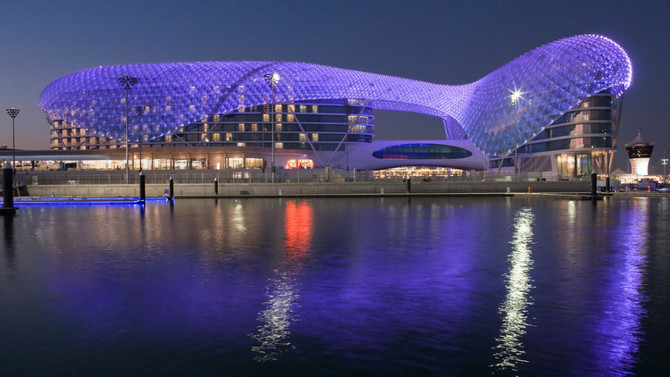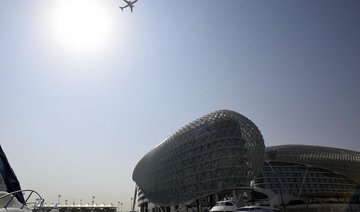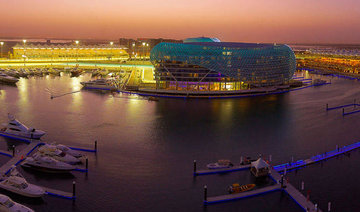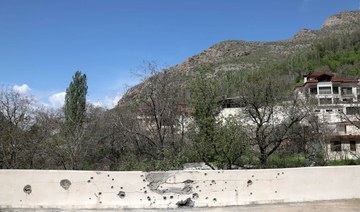DUBAI: Occupancy levels in Abu Dhabi hotels rose in April despite the lack of major events in the emirates that would have meant a high volume of bookings during the month.
In fact, according to industry watcher STR, it was the “second consecutive April with occupancy growth in Abu Dhabi.”
“In fact, the absolute occupancy level would be the highest for an April in the market since 2008,” STR said in its preliminary analysis for Abu Dhabi hotels.
Occupancy rate in Abu Dhabi hotels rose 2.7 percent to 80 percent in April, as demand rose 6.9 percent and supply increased 4.1 percent.
Average daily rate (ADR) was down 3.3% in 432.12 dirhams, which resulted into a 0.7 percent decline in revenue per available room (RevPAR) to 345.88 dirhams. ADR is an industry bellwether which measures realized room rental per day, while RevPAR is calculated by multiplying a hotel’s ADR by its occupancy rate.
“ADR decreases have been common in the market with supply growth a factor in that trend,” STR said.
Abu Dhabi is targeting to attract 8.5 million tourists a year by 2021 and has been ramping up efforts to promote the emirate as a culture and heritage destination, especially with the opening of Louvre Abu Dhabi, the only regional presence of the famous French museum.
The emirate expects to welcome 5.5 million hotel guests this year, up from about 5 million in 2017.
Abu Dhabi hotels report higher occupancy levels in April
Abu Dhabi hotels report higher occupancy levels in April

Biden’s remarks on Gaza hostages ‘setback’ for negotiations: Hamas

- “We endured three days that can be considered hell,” said Mohammed Hamad, a 24-year-old resident of eastern Rafah who was among the 300,000 Palestinians that Israel says have fled the fighting
- Israel has killed more than 34,700 Palestinians in Gaza, mostly women and children, according to the health ministry in the Hamas-run territory
GAZA: Remarks by US President Joe Biden that a ceasefire in Gaza would be possible if Hamas released its hostages are a “setback” to negotiations, the Palestinian goup said Sunday.
“We condemn this position by the US president, we consider it a setback from the outcomes of the latest round of negotiations, which led to the movement’s agreement to the proposal put forward by mediators,” Hamas said in a statement.
Biden said on Saturday that a ceasefire in the Israel-Hamas war would be possible “tomorrow” if Hamas gave up hostages seized in its Oct. 7 attack.
The US president raised the topic of the hostages during a speech in Seattle after warning Israel he would stop supplying artillery shells and other weapons if it sent ground troops into the city of Rafah.
Negotiations between Hamas and Israel for a truce and hostage exchange deal, mediated by Egypt, Qatar, and the US, appear to have stalled amid Israeli military action in the southern Gaza city.
Hamas said Israeli Prime Minister Benjamin Netanyahu had “rushed to overturn” the talks by launching an offensive in Rafah.
The militant group accused the Israeli government of “escalating their brutal massacres in various areas of the Gaza Strip” and “reaffirming their pursuit of continuing the genocidal war in Gaza.”
Israel defied international opposition this week and sent tanks and troops into eastern Rafah, effectively shutting a key aid crossing.
On Saturday, the Israeli military expanded an evacuation order for eastern Rafah and said 300,000 Palestinians had left the area.
War-weary Gazans flooded toward coastal areas of the Gaza Strip’s southern city of Rafah, fleeing heavy bombardment in eastern zones after Israel ordered them to evacuate.
“We endured three days that can be considered hell,” said Mohammed Hamad, a 24-year-old resident of eastern Rafah who was among the 300,000 Palestinians that Israel says have fled the fighting.
Eastern parts of the city have been heavily bombarded in recent days, according to witnesses, as Israel sent tanks and ground troops into the areas in “targeted raids.”
“They were among the worst nights for us since the beginning of the war,” Hamad said from Al-Mawasi, an area Israel has designated a “humanitarian zone” despite aid groups warning that it is unprepared for such an influx.
Rafah’s population had swelled to around 1.4 million after hundreds of thousands of Palestinians fled fighting in other areas of the Gaza Strip and sought shelter there during more than seven months of war.
“They started by distributing flyers in the morning, and immediately began brutal artillery and aerial bombardment without giving people a chance to think or organize their belongings properly,” Hamad said.
AFP photographers saw dozens of families loading furniture and household items on trucks and fleeing from Rafah, many heading for Khan Yunis, the main city in the south of the Palestinian territory.
Many people, especially women and children, lingered on streets outside their homes before moving out.
What We Are Reading Today: ‘Semi-Detached’

Author: JOHN PLOTZ
When you are half lost in a work of art, what happens to the half left behind? “Semi-Detached” delves into this state of being: what it means to be within and without our social and physical milieu, at once interacting and drifting away, and how it affects our ideas about aesthetics.
The allure of many modern aesthetic experiences, this book argues, is that artworks trigger and provide ways to make sense of this oscillating, in-between place.
Civilians evacuated from northeast Ukraine as Russia steps up assault

- Heavy fighting raged on Sunday as Russia attacks 27 settlements
KYIV: Thousands more civilians have fled Russia’s renewed ground offensive in Ukraine’s northeast that has targeted towns and villages with a barrage of artillery and mortar fire, officials said Sunday.
The intense battles have forced at least one Ukrainian unit to withdraw in the Kharkiv region, capitulating more land to Russian forces across less defended settlements in the so-called contested “gray zone” along the Russian border.
Meanwhile, a 10-story apartment block collapsed in the Russian city of Belgorod, near the border, with several deaths and injuries reported. Russian authorities said the building collapsed following Ukrainian shelling. Ukraine has not commented on the incident.
HIGHLIGHT
The Russian Defense Ministry said Saturday that Moscow’s forces had captured five villages on the border of Ukraine’s Kharkiv region and Russia. Ukraine’s leadership has not confirmed Moscow’s gains.
At least 4,000 civilians have fled the Kharkiv region since Friday, when Moscow’s forces launched the operation, Gov. Oleh Syniehubov said in a social media statement. Heavy fighting raged Sunday along the northeast front line, where Russian forces attacked 27 settlements in the past 24 hours, he said.
Analysts say the Russian push is designed to exploit ammunition shortages before promised Western supplies can reach the front line. Ukrainian soldiers said the Kremlin is using the usual Russian tactic by launching a disproportionate amount of fire and infantry assaults to exhaust their troops and firepower.
It comes after Russia stepped up attacks in March targeting energy infrastructure and settlements, which analysts predicted were a concerted effort by Moscow to shape conditions for an offensive.
Ukrainian President Volodymyr Zelenskyy said that disrupting Russia’s offensive in the area was a priority, and that Kyiv’s troops were continuing counteroffensive operations in seven villages around the Kharkiv region.
“Disrupting the Russian offensive intentions is our number one task now. Whether we succeed in that task depends on every soldier, every sergeant, every officer,” Zelenskyy said.
The Russian Defense Ministry said Saturday that Moscow’s forces had captured five villages on the border of Ukraine’s Kharkiv region and Russia. These areas were likely poorly fortified due to the dynamic fighting and constant heavy shelling, easing a Russian advance.
Ukraine’s leadership has not confirmed Moscow’s gains.
Pakistan defeat Ireland to level T20 series

- Ireland made a dynamic start after being put into bat as the hosts blasted 29 runs in the first three overs
- But Shaheen Shah Afridi put the brakes on Ireland’s assault, dismissing the opening pair in the fourth over
LONDON: Pakistan beat Ireland by seven wickets in the second Twenty20 international in Dublin on Sunday to set up a deciding showdown in the three-match series.
Ireland made a dynamic start after being put into bat as the hosts blasted 29 runs in the first three overs.
But Shaheen Shah Afridi put the brakes on Ireland’s assault, dismissing opening pair Paul Stirling and Andrew Balbirnie in the fourth over.
Lorcan Tucker and Harry Tector (32) put on 62 for the third wicket, with the former scoring 51 in 34 deliveries.
Curtis Campher (22) and George Dockrell (15) boosted the score before Gareth Delany’s 28 off 10 balls helped the hosts post 193 for seven.
Pakistan spluttered at the start of their chase as Saim Ayub was caught in the first over and skipper Babar Azam nicked Graham Hume behind to depart for a duck in the second.
But Ireland’s hopes of sealing a famous series win with a game to spare were dashed as Mohammad Rizwan (75 not out) and Fakhar Zaman (78) put on a stunning 140-run partnership.
Azam Khan added 30 from 10 balls to take Pakistan home with 3.1 overs unused.
Ireland had claimed their first ever T20 victory against Pakistan in the series opener on Friday, winning by five wickets with one ball to spare.
Pakistan will also face Ireland in the group stage of next month’s T20 World Cup in the United States and the West Indies.
Greek premier to visit Turkiye in quest for better relations

- President Erdogan says he wishes to ‘raise the level of bilateral ties to a new level’
ISTANBUL: Greece’s Prime Minister Kyriakos Mitsotakis will be received on Monday in Ankara by Turkish President Recep Tayyip Erdogan, in the latest sign of warming relations between the NATO neighbors.
Diplomats said the day-long visit marks a new phase in their relations after decades of tensions, occasionally broken by brief reconciliation periods.
It follows Erdogan’s trip to Greece in December.
In an interview published on Sunday in the Greek newspaper Kathimerini, Erdogan said talks would focus on “resolving problems” between the two neighbors.
“It falls to us to calm relations between the two countries and ensure that peace and tranquility reign forever on both sides of the Aegean Sea,” the Turkish leader said.
He added he wished to “raise the level of bilateral relations to a new level.”
In December, the regional rivals — divided over the island of Cyprus and dealing with migration through their respective waters — signed a declaration calling for “friendly and good neighborly relations, recognizing the importance of mutual respect and peaceful coexistence.”
But this appeasement, also helped by solidarity after an earthquake killed more than 50,000 in southeastern Turkiye in February 2023, has been undermined by Turkiye converting another former Byzantine church into a mosque.
After four years of restoration, the former Kariye Orthodox church in Istanbul reopened as a mosque on May 6.
The 2020 decision to convert the church came after Muslim services resumed at the 6th-century former Byzantine cathedral of Hagia Sophia. The landmark building has been a museum since 1935.
The changes were part of Erdogan’s efforts to galvanize his more conservative and nationalist supporters.
“There’s no shortage of mosques in the city. That is no way to treat cultural patrimony,” Mitsotakis said a week ago, although he has also said that “channels of conversation must remain open.”
Mitsotakis told Greek television station Alpha TV on Saturday that he will use Monday’s talks to push Erdogan to “reverse” Kariye’s conversion.
Last Monday, Greek Foreign Minister Giorgos Gerapetritis called the move a “provocation” but reiterated that “Athens is seeking as long a period of calm as possible in Greek-Turkish relations.”
Last December’s meeting did lead to some breakthroughs, such as new special visas for Turks to visit Greek islands near the Turkish coast. That has led to a tripling of Turkish visitors.
And Erdogan has not repeated any of his earlier threats to invade Greek islands to prevent their supposed militarization — threats that led the US Congress to block deliveries of F-16 fighters to Turkiye.
That veto was lifted in January, while the US approved the delivery of F-35s to Greece.
Since Turkiye’s military moves in 1974, disagreements remain over Cyprus, which is divided into the internationally recognized state of Cyprus in the south and the Turkish Republic of Northern Cyprus, which is recognized only by Turkiye.
Turkiye and Greece have also struggled to cooperate on migration.
Migrants from Asia and Africa use the seas around both countries to reach Europe.


















